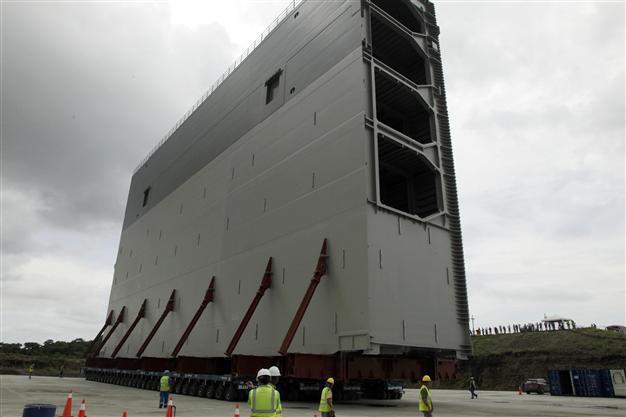Consortium threatens to stop Panama Canal expansion
MADRID - Agence France-Presse

In this Aug. 22. 2013 file photo, a section of the new rolling gates for the Panama Canal's third set of locks towers over workers during a press tour in Gatun, Panama. AP Photo
A Spanish-led consortium threatened Thursday to halt a massive, $5.3 billion (3.9-billion-euro) expansion of the Panama Canal, which handles five percent of world maritime trade, because of a row over cost overruns.
Spanish builder Sacyr, leader of the Grupo Unidos por el Canal consortium, said work will stop unless the canal pays $1.6 billion in cost overruns for work on the 80-kilometre (50-mile) waterway connecting the Atlantic and Pacific Oceans.
"GUPC has formally informed the Panama Canal Authority that it will suspend work if the failures to comply are not put right within the advised period," Sacyr said in a statement to Spanish market regulators.
The consortium said it had set the canal authorities a 21-day deadline before suspending the project to install a third set of canal locks.
The news sent Sacyr shares plunging by more than 18 percent as trade opened on the Madrid stock exchange. By late morning they were down 8.95 percent at 3.43 euros. On Wednesday, Panama canal administrator Jorge Quijano warned that the canal authority would use contractual mechanisms to ensure the completion of the canal expansion.
"No matter what kind of pressure is exercised against the ACP (Panama Canal Authority), we maintain our demand that Grupo Unidos por el Canal respect the contract that they agreed to and signed," he said in a statement quoted by Panama media.
A year ago, GUPC demanded an extra payment of $1.6 billion from the ACP due to construction delays.
Led by Spain's Sacyr, the consortium also includes Impregilo of Italy, Belgian firm Jan De Nul and Panama's Constructora Urbana.
It began work on a third set of locks for the canal in 2009 and expects to complete construction in June 2015, already a nine-month delay over the date set in the contract.
The new locks will accommodate larger ships with a capacity of 12,000 containers -- instead of those with 5,000 containers that are now able to navigate the canal.
Some 13,000 to 14,000 ships navigate the canal each year.
According to the canal authority, there was a delay of four months shortly after the project began because GUPC had planned to use lower-quality cement that would have prevented the construction from lasting more than 100 years.
But Sacyr said the GUPC consortium had submitted justified claims for $1.625 billion in cost overruns due to "unforeseeable" circumstances to the relevant authorities, including the International Court of Arbitration.
"GUPC is maintaining communication with the Panama Canal Authority to reach a satisfactory agreement to put an end to the contractual imbalance," it added.
The canal uses a system of locks to raise ships from sea level and enable them to sail through the continental divide.
